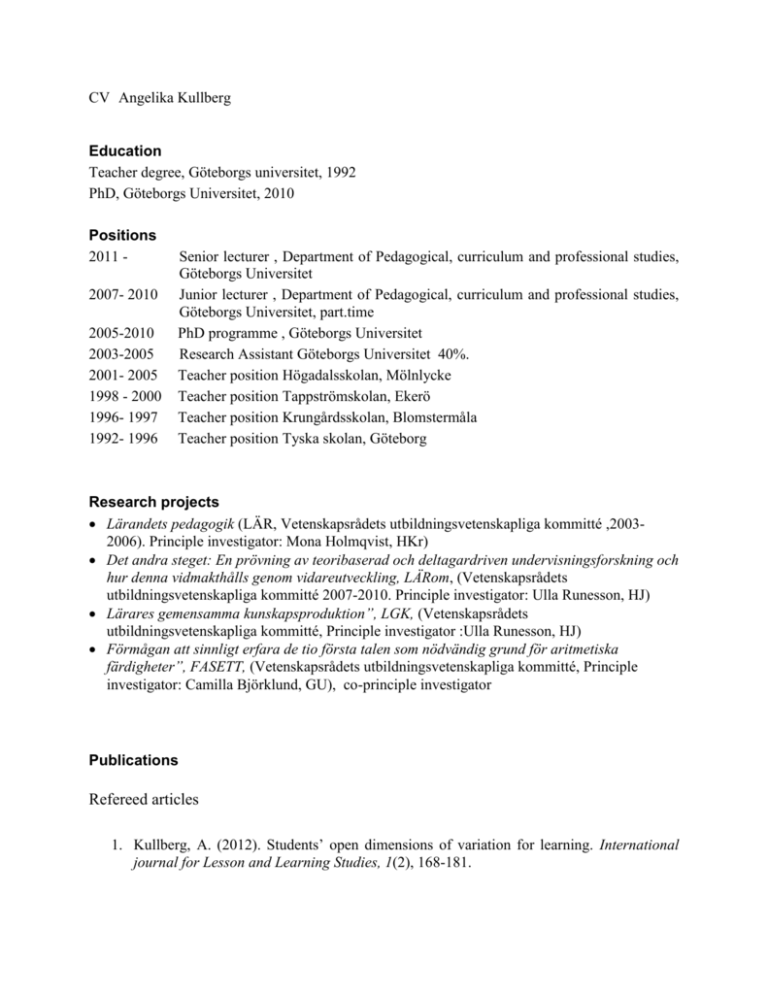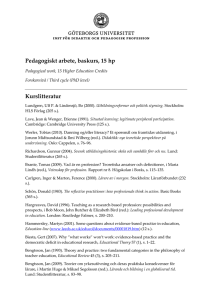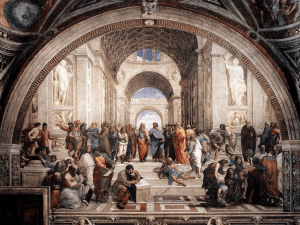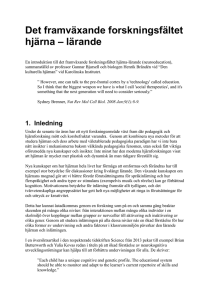My CV - Göteborgs universitet
advertisement

CV Angelika Kullberg Education Teacher degree, Göteborgs universitet, 1992 PhD, Göteborgs Universitet, 2010 Positions 2011 2007- 2010 2005-2010 2003-2005 2001- 2005 1998 - 2000 1996- 1997 1992- 1996 Senior lecturer , Department of Pedagogical, curriculum and professional studies, Göteborgs Universitet Junior lecturer , Department of Pedagogical, curriculum and professional studies, Göteborgs Universitet, part.time PhD programme , Göteborgs Universitet Research Assistant Göteborgs Universitet 40%. Teacher position Högadalsskolan, Mölnlycke Teacher position Tappströmskolan, Ekerö Teacher position Krungårdsskolan, Blomstermåla Teacher position Tyska skolan, Göteborg Research projects Lärandets pedagogik (LÄR, Vetenskapsrådets utbildningsvetenskapliga kommitté ,20032006). Principle investigator: Mona Holmqvist, HKr) Det andra steget: En prövning av teoribaserad och deltagardriven undervisningsforskning och hur denna vidmakthålls genom vidareutveckling, LÄRom, (Vetenskapsrådets utbildningsvetenskapliga kommitté 2007-2010. Principle investigator: Ulla Runesson, HJ) Lärares gemensamma kunskapsproduktion”, LGK, (Vetenskapsrådets utbildningsvetenskapliga kommitté, Principle investigator :Ulla Runesson, HJ) Förmågan att sinnligt erfara de tio första talen som nödvändig grund för aritmetiska färdigheter”, FASETT, (Vetenskapsrådets utbildningsvetenskapliga kommitté, Principle investigator: Camilla Björklund, GU), co-principle investigator Publications Refereed articles 1. Kullberg, A. (2012). Students’ open dimensions of variation for learning. International journal for Lesson and Learning Studies, 1(2), 168-181. 2. Kullberg, A. (2012). Can findings from learning studies be shared by others? International journal for Lesson and Learning Studies, 1(3), 232-244. 3. Kullberg, A., & Runesson, U. (2013). Learning about the numerator and denominator in teacher designed lessons. Mathematics Education Research Journal, 25(4), 547-567. 4. Kullberg, A., & Runesson, U., & Mårtensson, P. (2014). Different possibilities to learn from the same task. PNA, 8(4), 139-150. 5. Kullberg, A, Runesson, U., Marton, F., Nilsson, P., Vikström, A., Mårtensson, P., & Häggström, J. (in press). Teaching one thing at a time or several things together? – Teachers changing their way of handling the object of learning by being engaged in a theory-based professional learning community in Mathematics and Science. Teachers and teaching. Theory and practice, x(x),x-x. Monograph 6. Kullberg, A. (2010). What is taught and what is learned. Professional insights gained and shared by teachers of mathematics. Göteborg studies in Educational sciences no 293. Göteborg: Acta Universitatis Gothoburgensis. (PhD thesis) Books/Bookchapters 7. Kullberg, A. (2009). Elevers möjligheter att lära sig samma sak i olika klassrum, I U. Runesson. & K. Rönnerman. (Red.). Pedagogiskt arbete. Ett forskarutbildningsämne i utveckling på IPD. IPD-rapporter 2008:08. 8. Runesson, U., & Kullberg, A. (2010). Learning from variation. Differences in learners’ ways of experiencing differences. In B. Sriraman, C. Bergsten, S. Goodchild, C. Michelsen, G. Palsdottir, O. Steinthorsdottir & L. Haapasalo, (Eds.), The Source book on Nordic Research in Mathematics Education.pp.299-318, Charlotte, NC: Information Age Publishing. 9. Kullberg, A. (2011). What does it take to learn negative numbers? In J. Emanuelsson, L. Fainsilber, J. Häggström, A. Kullberg, B. Lindström, & M. Löwing, (Eds.) Voices on learning and instruction in mathematics, pp. 215-226 Göteborg: National Centre of Mathematics Education, University of Gothenburg. 10. Emanuelsson, J., Fainsilber, L., Häggström, J., Kullberg, A., Lindström, B., Löwing, M. (2011). (Eds.) Voices on learning and instruction in mathematics. Göteborg: National Centre of Mathematics Education, University of Gothenburg. 11. Kullberg, A. (2011). Nycklar till elevernas lärande. I B. Jansson (Red.). Den utbildningsvetenskapliga kärnan, p. 165-179, Malmö: Gleerup. 12. Runesson, U., Kullberg, A., & Maunula, T. (2011). Sensitivity to student learning – a possible way of learning to enhance learning? In P. Sullivan & O. Zaslavski, Constructing knowledge for teaching secondary mathematics: Tasks to enhance prospective and practicing teacher learning, pp. 263-278, London: Springer. Refereed proceedings 13. Kullberg, A. &, Runesson, U. (2006). Exploring teaching and learning of letters in algebra: a report from a Learning study. In Novotná, J., Moraová, H., Krátká, M, & Stehlíkova, N. (Eds). Proceedings of the 30th Conference of the International Group for the Psychology of mathematics Education, Vol 1, p. 273. Prague: PME. 14. Kullberg, A. (2007). Different possibilities to learn infinity of decimal numbers. In Woo, J.H., Lew, H.C., Park, K.S. & D.Y. (Eds.). Proceedings of the 31st Conference of the International Group for the Psychology of Mathematics Education, Vol 1, p. 319. Seoul: PME. 15. Kullberg, A. (2007). Can lessons be replicated? In J.H. Woo, H.C. Lew, K.S. Park, & D.Y. Seo, (Eds.). Proceedings of the 31st Conference of the International Group for the Psychology of Mathematics Education, Vol 3, pp. 121-128. Seoul: PME. 16. Kullberg, A., Watson, A. & Mason, J. (2009). Variation within, and covariation between, representations. In M. Tzekaki, M. Kaldrimidou & C. Sakonidis (Eds.), Proceedings of the 33rd Conference of the International Group for the Psychology of Mathematics Education. Vol. 3, pp. 433-440. Thessaloniki, Greece: PME. 17. Kullberg, A. (2011). Exploring students’ learning of fractions. In B. Ubuz (Ed.), Proceedings of the 35th Conference of the International Group for the Psychology of Mathematics Education. Vol. 1. p. 343. Ankara, Turkey: PME 18. Runesson, U., Kullberg, A. &, Maunula, T. (2011). Learning from learners and teaching. A learning study of critical features for learning to add and subtract negative numbers. In B. Ubuz (Ed.), Proceedings of the 35th Conference of the International Group for the Psychology of Mathematics Education, Vol. 1. pp. 111-114. Ankara, Turkey: PME 19. Kullberg, A. (2013). Low-achieving students’ learning of the density of rational numbers. Symposium contribution at the Annual American Educational Research Association conference, AERA, San Francisco 26 April-1 May. Published online AERA web. 20. Kullberg, A., Runesson, U., & Mårtensson, P. (2013). Changes in teaching equations with one unknown after participating in learning studies. In Lindmeier, A. M. & Heinze, A. (Eds.). Proceedings of the 37th Conference of the International Group for the Psychology of Mathematics Education, Vol. 5, p. 93. Kiel, Germany, July 28 – August 02. 21. Kullberg, A., Runesson, U., & Mårtensson, P. (2013) The same task? - different learning possibilities. In C. Margolinas, C. Task Design in Mathematics Education. Proceedings of ICMI Study 22.International Commission on Mathematical Instruction (ICMI), ISBN 9782-7466-6554-5 Conference papers 22. Kullberg, A. (2006). From Learning study to Design study. Paper presented at EARLI SIG 9 Biennial Workshop, 7-9 Dec., University of Hong Kong. 23. Kullberg, A. (2006). Teaching for understanding infinity of rational numbers. Paper presented at the 2nd Annual Conference on Learning Study, 1-2 Dec., Hong Kong Institute of Education. 24. Kullberg, A. (2007). Students opening up dimensions of variation for learning negative numbers. Paper presented at the World Association of Lesson Studies international conference, 29 Nov-1 Dec., Hong Kong Institute of Education. 25. Kullberg, A. (2008). Relating classroom teaching to student learning about negative numbers. Paper presented at EARLI SIG 9 Biennal conference, 22-24 May, Kristianstad. 26. Runesson, U., Kullberg, A. & Maunula, T. (2008). Learning study: A possible way to learn about students' learning. Paper presented at Symposium, ‘Learning study: East and West’, ECER 10-13 September, Gothenburg. Discussant: John Elliott 27. Kullberg, A. (2009). What is the next number after 0.97? Validating critical features for learning about density of rational numbers. Paper presented at The World Association of Lesson studies International Conference, 7-10 December, Hong Kong Institute of Education. 28. Kullberg, A. (2010). Making use of findings from China in Sweden: teaching non unit fractions as a part of a group of objects. Paper presented at Nätverksträff för Fenomenografi och Variationsteori, Göteborgs Universitet, Institutionen för didaktik och pedagogisk profession, 9-10 November. 29. Kullberg, A. (2010). Is knowledge gained by teachers from learning studies transferable to other learners? Paper presented at symposium at The World Association of Lesson studies International conference, 9-10 December, Brunei University. Symposium presentation, discussed by Catherine Lewis. 30. Kullberg, A. (2011). What is taught and what is learned. Paper presented at The World Association of Lesson studies International conference, University of Tokyo, Japan, 26-28 November. Symposium “Young researchers’ network”, discussed by Catherine Lewis. 31. Kullberg, A. (2011).What is critical for pupils’ learning of fractions and what does a critical feature entail? Paper presented at The World Association of Lesson studies International conference, University of Tokyo, Japan, 26-28 November. 32. Kullberg, A. (2012). Feedback opens and closes dimensions of variation. A case study about learning fractions in the third grade. Paper presented at the EARLI SIG 9 Variation theory and Phenomenography biennal conference, 27-28 August, Jönköping, Sweden. 33. Kullberg, A., Runesson, U., & Mårtensson, P. (2012). Exploring teachers’ learning from three learning studies in mathematics. Paper presented at The World Association of Lesson studies International conference, University of Singapore, Singapore, 28-30 November. 34. Runesson, U., Kullberg, A., & Mårtensson, P. (2012). Symposium contribution presented at The World Association of Lesson studies International conference, University of Singapore, Singapore, 28-30 November. 35. Kullberg, A., Mårtensson, P., & Runesson, U. (2013). Teachers’ exploration and search for the external and internal horizon of the object of learning. Invited SIG symposia presentation: The variability of the object of learning. 15th Biennial EARLI conference Programme book, p. 53. Munic, Germany, August 26-31. 36. Kullberg, A. & Runesson, U. (2013). Using simultaneity, variation and invariance to handle the content: Changes in teachers’ teaching of the same topic in mathematics after participation in learning studies. Symposia presentation: Does LS make a difference? Changes in teachers’ teaching of the same topic in mathematics after participation in learning studies. The World Association of Lesson studies International conference, Gothenburg, Sweden, September 6-9. Other publications 37. Kullberg, A. (2004). Tal. delar och oändlighet. En studie om avgörande skillnader i undervisning och lärande om decimaltal. Institutionen för pedagogik och didaktik, Cuppsats, Göteborgs Universitet. 38. Kullberg A. & Runesson, U. (2007). Möte med bokstäver i matematik. Nämnaren, (1). 39. Kullberg, A. (2011). Vad lär eleverna och vad görs möjligt för dem att lära? Svensk Förening för Matematikdidaktisk Forskning, nr 17, s. 17-20. 40. Holmqvist, M., Kullberg Borgstrand, C., & Kullberg, A. (2013) . Lesson study and learning study as teacher research. The World Association of Lesson studies international conference programme book. Gothenburg: Gothenburg University 41. Kullberg, A., & Runesson, U. (2014). Möte med bokstäver i matematik. I Nämnaren Tema 10, s. 449-455. Göteborg: Göteborgs Universitet, NCM. Scientific meetings 2013 Co-chair WALS14 Local organization committé Göteborgs universitet 2014 Co-chair organizing committé EARLI (European Association of Research on Learning and instruction) SIG 9 (Phenomenography and variation theory) conference in Oxford, Regents Park College 1-3 September 2014- Member of Scientific committee Lausanne Laboratory Lesson Study, Haute école pédagogique, (one of four international members) Schweiz 2013 - 2016 Cordinator for EARLI (European Association of Research on Learning and instruction) SIG9 (Phenomenography and variation theory) Invited speaker 2008 Invited seminar Title: “Design studies in mathematics: implementing and validating variation”. Department of Education Oxford University, UK, 16th of October. Moderator: Anne Watson 2009 Invited presentation at symposium/workshop, SA-SW-lincs project: Developing strategies for promoting scientific literacy, Title: Learning study and variation, Göteborgs Universitet 20 October, Moderater: Åke Ingermann, Speakers: Ference Marton and Angelika Kullberg 2009 Invited presentation at doctoral candidate conference. Title: What difference does teaching make for student learning?, Hong Kong University 2nd December, Moderator: Ming Fai Pang 2009 Invited symposium, First Swedish Research Link Symposium on Variation Theory and Learning Study, Title: What is the next number after 1? Critical features and its effect for teaching and learning about density of rational numbers, University of Hong Kong, the 3rd and 4th of December. Moderator: Ming Fai Pang and Ference Marton, 2011 Invited roundtable presentation Title: What is taught and what is learned. Discussant Catherine Lewis, Tokyo University , Japan, 26-28 of November. 2012 Colloquium presentation: In what ways do teachers change their teaching after participating in learning studies?, Centre for research in mathematics and science education, San Diego State University, CRMSE , 9 November. 2012 Invited lecture at the doctoral program about learning study and variation theory, Centre for research in mathematics and science education, San Diego State University, CRMSE, 2 November. 2013 Invited plenary panel speaker, “Variation theory and tasks in mathematics education”, ICMI- study group 22, 25 July, Oxford University, Oxford. 2013 Invited lecturer Pädagogische Hochschule für NÖ, Baden, Österrike, 13-14 september 2013 Invited SIG symposium EARLI, The variability of the object of learning. Title of presentation: Teachers’ exploration and search for the external and internal horizon of the object of learning, 27 August 2013 Presentation på Vetenskapsrådets resultatdialog av Ference Marton och Ming Fai Pangs VR-projekt, titel på presentation: Effekter av likheter och skillnader mellan exempel valda att främja lärandet, Stockholms Universitet, 11 november 2014 Invited Keynote speaker, First Korean Mathematics Teachers' Association meeting, Deajon, South Korea, January 7. (1000 teachers) 2014 Two invited workshops for Korean teachers on Learning study and variation theory, Deajon, South Korea, January 8. 2014 Invited plenary panel on Variation theory, Lesson study and Realistic mathematics education (RME), Deajon, South Korea, January 8. 2014 Invited talk at Seoul National University, Seoul, South Korea, January 9 2104 Invited plenary panel on Variation theory, Lesson study and Realistic mathematics education (RME) for doctoral students, Seoul National University, Seoul, South Korea, January 9. 2014 Invited speaker on the conference “Learning Study in Teacher Education – Learning Study as an instrument of reflection and research”, Pädagogische Hochschule, Baden, Österrike, 22 February 2016 Invited lecture at ICMI13, Topic study group 36: Task design, analysis and learning environments, 24 July-31 July, Hamburg Academic visits 2008 Academic visitor at the Department of Education, Oxford University 15th of October-13th of November. 2012 Visiting professor at CRMSE- Center for Research in Mathematics and Science Education, San Diego State University, US, 23 Oktober- 13 November. Reviewer International Journal of Science and Mathematics Education Mathematics Education Research Journal International Journal for Lesson and Learning Studies Forskning om undervisning och lärande Research reports PME, [Psychology of Mathematics Education, no 38, 37, 36, 35, 34] NORMA 14 [Nordic research in mathematics education] MADIF 8 [Matematikdidaktisk forskningsseminarium]


